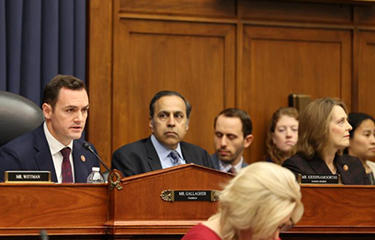A U.S. House committee focused on US-China trade competition has issued a report calling for a crackdown on imports of seafood from China potentially processed using forced labor.
The House Select Committee on the Strategic Competition Between the United States and the Chinese Communist Party issued a bipartisan report on Tuesday, 12 December with 150 policy recommendations designed to reset U.S. economic relations with China.
The report, “Reset, Prevent, Build: A Strategy to Win America’s Economic Competition with the Chinese Communist Party,” provides recommendations to help the U.S. combat and compete with China’s “non-market practices.”
“With this report, the Select Committee has shown that the bipartisan will exists to meet the call of history. It embraces the clear reality that our current economic relationship with the People's Republic of China needs to be reset in order to serve the economic and national security interests of the United States, while offering nearly 150 bipartisan recommendations for Congress to legislate,” U.S. Reps. Mike Gallagher (R-Wisconsin) and Raja Krishnamoorthi (D-Illinois) said. “Collectively, these recommendations will reset the terms of our relationship with the PRC, prevent the flow of American capital and technology from supporting its military advances and human rights abuses, and build collective economic resilience in concert with our allies and partners while ensuring American leadership for decades to come."
Earlier this year, the administration of U.S. President Joe Biden initiated a policy of reengagement with China, culminating in a meeting between Biden and China President Xi Jinping in the U.S. state of California in November 2023.
However, U.S. lawmakers have taken China to task for alleged labor abuses in its distant-water fleet and in its seafood processing facilities, and a bill that would ban the import of Chinese seafood imports has been introduced in the U.S. Senate.
The House committee’s report calls for the U.S. Congress to expand the “rebuttable presumption” in the Uyghur Forced Labor Prevention Act (UFLPA) to include all Chinese seafood products, not just those produced in Xinjiang province. The rule change would require importers of Chinese seafood to provide sufficient evidence Uyghur labor was not used in its production
The Outlaw Ocean Project has documented extensive evidence China’s seafood processing industry has made use of Uyghur labor, but no imported Chinese seafood has been flagged under the UFLPA to-date.
The committee also called for an increase in the U.S. government’s investigative capacity and enforcement of transshipment, tariff evasion, money laundering, and UFLPA violations. And it called for the passage of the Strengthening the Uyghur Forced Labor Prevention Act, which it said would strengthen safeguards preventing the import of Chinese products made with forced labor from entering the United States.
Additionally, the committee recommended Congress make all Chinese seafood products subject to the Seafood Import Monitoring Program (SIMP) “to ensure the United States is not complicit in the PRC’s practice of illegal, unreported, and unregulated fishing.”
Also among the 150 recommendations was a suggestion that …
Photo courtesy of House Select Committee on the Strategic Competition Between the United States and the Chinese Communist Party








